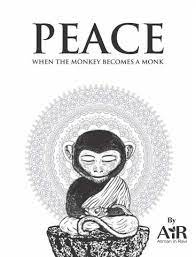Understanding
the Role of Man in Vedic Philosophy for a Fulfilling Life
In the realm of Vedic philosophy, the explanation for the miseries of life does not lie in blaming a higher power. Instead, it rests upon the understanding that individuals have an active role in shaping their own destiny. Man contributes the materials from which his life and surroundings are constructed. Embracing this understanding allows us to willingly align ourselves with the natural order, leading to a consecrated existence that focuses on pleasing God.
In
this state of mind, our primary objective shifts from pursuing personal
happiness or catering to our whims and preferences, to offering ourselves as
instruments for God's use. We aspire for our hands and feet, our hearts and
minds to be employed in carrying out tasks that are acceptable to Him. With
such elevated thoughts occupying our minds, trivial matters find little room to
dwell upon. This is the path through which great souls shoulder their burdens,
not through a morbid tolerance that yields minimal benefits, but through the
endurance that springs from wisdom—a power that brings forth joy.
Merely
enduring circumstances out of obligation renders us slaves to our conditions.
However, when we recognize that we endure to transcend those very conditions
and strive for a higher purpose, we not only improve our situation but also
transcend it. By embracing responsibility and striving for a greater end, we
not only better our circumstances but rise above them.
Transcending
the Monkey Mind: Mastering Thoughts and Actions
The story of the man hanging upside down from a tree branch serves as a metaphor for the human mind and its control over our actions. To gain control over our thoughts and actions, we must first realize that our mind, like a monkey trainer, manipulates us. Merely trying to control the mind while being enslaved by it is futile.
Every
action we take, whether walking, talking, eating, or laughing, is orchestrated
by the mind. To break free from its control, we must go beyond the mind to the
realm of intellect, or buddhi. By utilizing our intellect, acquiring knowledge,
and gaining a broader perspective, we can detach ourselves from the mind's
influence without becoming disinterested or indifferent. Only then can we truly
control our thoughts and actions.
The
question then arises: how can we liberate ourselves from the mind's shackles?
The first step is to center the mind, which constantly leads us astray, by
focusing on transcending it. Practices such as meditation, chanting,
recitation, singing, painting, or simply being present can help calm our minds
and free us from distractions.
Mindful living also plays a crucial role in breaking free from the mind's grasp. Practicing mindfulness allows us to infuse grace and joy into even the most mundane activities. By mindfully engaging in everyday tasks, such as brushing our teeth, eating an orange, or walking, we cultivate equanimity and sharpen our skills in managing the mind. Being fully present in each moment helps us steer clear of distractions and negative thoughts that cloud our minds and hinder clarity.
In
addition to regular practice, cultivating gratitude for both positive and
negative experiences fosters inner peace, forgiveness, and centeredness.
Embracing a state of plenitude or emptiness through consistent practice
gradually lifts us above the monkey mind. This journey ultimately leads to
experiencing a lightness of being. Even fleeting moments of inner light serve
as signs of progress towards mastering our actions and thoughts.
By
transcending the monkey mind, we embark on a path of self-mastery, where our
thoughts and actions align with our higher consciousness.
IF
HE EXIST
I drive joy there was a doctor in Benaras who
spent 7 minutes in the morning and evening for mediation on God. Knowing this,
his colleagues and friends laughed at him. One day they argued that he was
wasting 7 precious minutes on something, which he had been misled into believing.
The doctor replied, “Well, if God does not exist, I agree that I am wasting 7
minutes a day. But, if He exists? I am afraid you are wasting your entire
lifetime. I prefer to waste 7 minutes rather than a lifetime. Why should you
grudge me the 7minutes joy that I derive 4m.-
ILLUSTRATED REVIEW :7th heaven moment of the
week in ipl lasg won by 7 wk, Pernal no 7 got motm











No comments:
Post a Comment